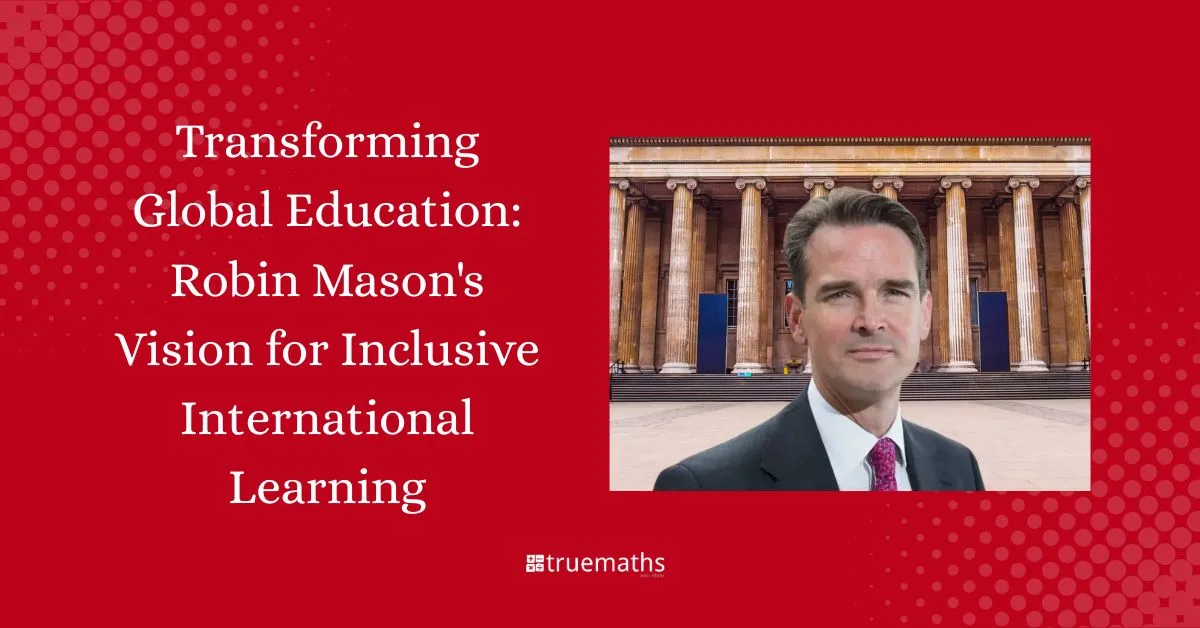Robin Mason’s Vision: Inclusive, Global Transformation in Education
By Truemaths, Last Updated 29 May, 2025 3 min read

In an exclusive interview with ET Education, Robin Mason, Pro-Vice-Chancellor (International) at the University of Birmingham, shares his insights on the evolving landscape of global education. He emphasizes the importance of inclusivity, innovation, and strategic partnerships, particularly between the UK and India, in shaping the future of higher education.
The Evolving UK-India Educational Partnership
Mason highlights the deepening collaboration between the UK and India, moving beyond traditional academic exchanges to more strategic alliances. He notes that both nations are aligning their educational priorities around key areas such as sustainability, digital health, artificial intelligence (AI), and workforce readiness. These shared goals are fostering more meaningful engagements between institutions, industries, and governments.
The University of Birmingham is actively expanding its partnerships in India through joint research centers, dual-degree programs, and transnational education initiatives. Mason sees immense potential for collaboration in areas like climate resilience and AI, aligning with India’s national objectives
Challenges Faced by Indian Students
While Indian students are among the most academically gifted and globally ambitious, Mason acknowledges the challenges they face in translating their international education into long-term career success. These challenges include navigating complex visa landscapes, understanding local job markets, and building professional networks in unfamiliar environments.
To address these issues, Mason advocates for a more proactive role by global universities. This includes embedding employability into the curriculum, offering culturally responsive career services, and creating stronger alumni and employer networks in India. Collaborations with industry are also crucial to building clearer pathways for students, both in the UK and upon their return to India.
Enhancing Employability Through Strategic Initiatives
The University of Birmingham, in partnership with the University of Glasgow, has launched a new career support service aimed at empowering international students, particularly those from India. This initiative includes establishing a graduate careers service based in India to provide tailored employability support to returning graduates. The service will collaborate with Indian employers and industry advisory boards, offering practical support through pre-entry briefings and post-graduation engagement.
Additionally, both universities are enhancing support for international students during their studies in the UK. Dedicated International Engagement Teams within their Careers Services provide access to bespoke career advice, alumni mentoring opportunities, and employer-led events aimed at improving student outcomes.
Bridging Academia and Industry
Mason emphasizes the vital role of UK universities in building stronger bridges between academia and industry, especially with Indian corporates and institutions. By working closely with industry partners in areas like data science, AI, and sustainable technologies, universities can significantly boost employability through real-world exposure and practical learning opportunities.
Engaging with Indian research institutions and government bodies to co-develop solutions to shared challenges, such as supporting farmers through advanced post-harvest management or contributing to sustainable development, not only strengthens research and policy impact but also opens meaningful pathways for students, alumni, and professionals across both countries.
The Transformative Power of AI in Education
Mason views the rise of AI as one of the most transformative forces shaping global education today. He notes that 2025 is a pivotal year for its widespread adoption, with India declaring it the ‘Year of Artificial Intelligence’—a bold step aiming to impact 40 million students and over 14,000 institutions by drawing on global best practices. The UK is also advancing AI within universities and continues to be an active player in international education innovation.
Mason participated in a roundtable in New Delhi titled ‘Transforming Higher Education – AI Innovation and Implementation in Indian Universities and Beyond,’ bringing together academic leaders, policymakers, industry experts, and researchers to explore how AI can enhance learning experiences, drive innovation, and prepare students for an AI-integrated future.
He believes AI allows for more personalized learning, strengthens student support through predictive analytics, and opens exciting possibilities in interdisciplinary research. However, it also brings forth critical ethical and societal considerations that must be addressed thoughtfully through education and public dialogue.
A Vision for Inclusive Global Education
Looking ahead, Mason is excited about the potential of international education to become a true force for global innovation and equity. He envisions a move beyond traditional models of student mobility toward more inclusive, flexible, and digitally enabled forms of collaboration that can reach far more learners across borders.
His approach to building global partnerships is rooted in three key principles: mutual respect, long-term impact, and shared value. For Mason, it’s not just about recruitment but about creating meaningful, enduring relationships that advance knowledge, drive innovation, and contribute to broader societal progress.
As the global landscape of higher education continues to evolve, leaders like Robin Mason are at the forefront, championing a transformative, inclusive, and innovative approach to international learning.
Source: ET Education


























